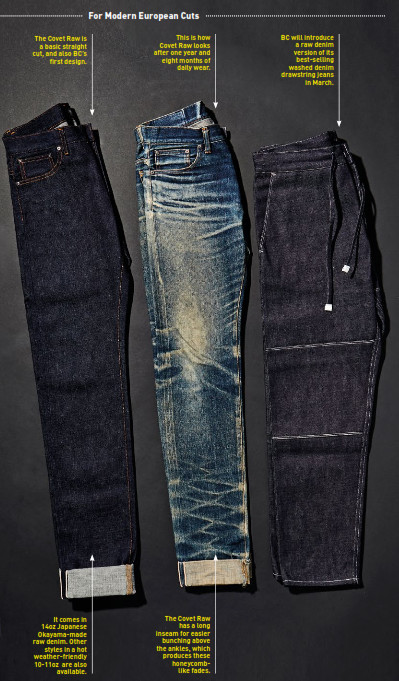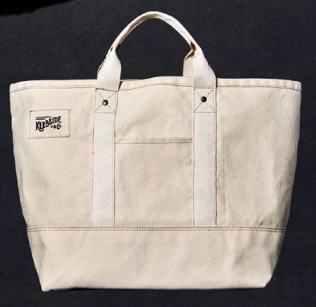The last of the 12 animals of the Chinese zodiac is also the fifth most intelligent in the world.



Chopard’s L.U.C XP Urushi Year of the Pig watch is limited to 88 pieces. $32,900
BACKGROUND PHOTO 123RF

The Case For Raw Denim
They’re the opposite of “buy, wear and toss” jeans, and three SG brands show how they’ve made them their calling.
In this era of instant gratification, raw denim is deliberately slow. It takes a lot of consistent wear and patience before it becomes what it’s supposed to be – something that’s personally yours, where initial stiffness and dark indigo eventually give way to a softer, more individual fit, and all natural fades come from your daily movements and wear, not from a sandblaster in a factory.
It has lingo even we get confused about. Here’s how not to be.
Selvedge: This word is used a lot in reference to raw denim, but it’s not a material or a kind of wash. It’s the way a fabric has been woven to have finished edges that prevent it from unravelling or fraying. Japanese mills are known for producing selvedge denim on vintage shuttle looms.
Whiskers: Fades on jeans around the waist and crotch that resemble, been woven to have finished well, whiskers.
Slubby: Refers to fabric with an irregular texture.
Weight: Raw denim comes in different weights. The standard is 12-15oz (0.340.43kg). A lighter weight is thinner, and a heavier is thicker, which will take longer to break in.
Sanforise: Sanforisation is a process that stabilises raw denim against further stretching or shrinking. Sanforised jeans are usually true to size, while unsanforised ones typically shrink after the first wash. So read the brand’s advice to either size up or down.


Biro Company
This brand has been an adopter of raw denim from Japan since 2013. Founders and brothers Chong Keng How, 37, and Kage Chong, 34, use it as much as possible in their designs.
“Raw denim is the real deal,” says the older Chong. “It has an ageing property like leather does. It moulds to your body and tells the story of your daily life. It has depth. People who work in different trades will end up with jeans that look completely different. Like leather wallets, everyone can buy the same one, but they will age differently depending on how you use them.”

Besides jeans, Biro Company also makes raw denim jackets. $460

For Americana Heritage-style Workwear
Lot 81-01 is Kerbside & Co.’s most popular style. Made of raw denim from Japan’s Kurabo Mill, it achieved its “slightly hairy and softer to the touch” effect after experimentation with different washing methods and temperatures.
Lot 81-01s are washed just once “to wring out the stiffness”. Each pair comes with a swatch of the fabric in its pre-washed state so you can see what it originally looked like.
Fahmy mainly uses deadstock raw denim for its exclusivity and limited quantities – like the ones from the defunct Cone Mills, America’s last and most famous selvedge denim mill, which shut down in October 2017. Cone Mills’ denim fabrics are considered collectibles. “I am now carefully considering what to make with that last batch of fabric I have.” The back pockets are lined with Japanese heavy twill fabric for longevity.

Kerbside & Co.
As a brand that started in 2015, it doesn’t have much heritage to speak of, and all its wares are new. But what founder Fahmy Ismail, 43, lacks in the vintage department, he makes up for with his knowledge of the old guards – Levi’s and Lee – and vintage American workwear from the mid-20th century.
“In the mid-’90s, I started collecting jackets, shirts, canvas pants and denim jeans from the ’40s and ’50s, though I eventually sold most of them when my collection grew too massive,” says Fahmy.
After two decades in the media industry, he left his job in 2014 and returned to his fi rst love, raw denim. He e-mailed hundreds of suppliers in Japan and the US, found a handful who were willing to work with the quantity he could produce, and with his savings, he purchased expensive bolts of raw denim, had them made into jeans in Japan, and started Kerbside & Co.
He does everything the oldfashioned way, at his own pace. He has an Instagram account, but no Facebook. He also hasn’t quite figured out how to make his website SEO-friendly, but he is in no hurry to.
Without any real marketing push, Kerbside & Co. has been featured at least fi ve times in Dutch, Italian and American magazines and denimrelated websites, and has loyal customers in the West.
“So far, 70 per cent of my customers are from America, while 25 per cent are from Europe. Only about 5 per cent are from Asia, including Singapore.” He answers all e-mail queries, and has even accepted requests to make size 44 jeans at no additional charge despite the large amount of extra raw denim required (his off -the-rack sizes currently go up to 36). Denim enthusiasts who recognise the fabrics he uses have also guessed – correctly – that he is not making much of a profit, but Fahmy is not raising prices yet.
While customers here favour skinnier fits with stretch, Fahmy sticks to his brand – Americana style with zero stretch.
“This may not be a good business model, but I am not out to rule the world,” he says. “I’ve made my money from working for a few decades, and now I just want to put effort into making good-quality products.”



Journal Projects raw denim comes from Okayama, Japan; Thailand; and sometimes China. It’s in different weights from 12-18oz (the lighter weights offer a more comfortable fit). Seasonal olive or grey denim are also available occasionally.
Japan specialises in very heavily textured – slubby – raw denim. The irregular texture means “fades will pop more” the longer you wear the clothing. Expect to pay $30-$40 more for Japanese raw denim.
Journal Projects’ jeans are sewn in Indonesia. The country’s own raw denim brands are now rising internationally.

Getting a pair of this brand’s jeans has been a unique experience since founder Lincoln Thong, 25, changed its ready-to-wear denim model to a one-of-a-kind concept. Every pair of raw denim jeans is made to the customer’s specifications, from the obvious (picking the kind of raw denim and hardware, pocket style and thread colour) to the extras (waist adjusters, hidden rivets and back cinches).
His early customers were the catalyst for the change: They requested customised features.
“It’s for the better, as raw denim becomes more personalised over time, and if you can customise it from the start, that makes it even more individual,” Thong says. “I also really like slow fashion – things that last a long time and look better as you wear them.”
Journal Projects neither has a physical store nor takes orders on its website year-round. It takes pre-orders just four to five times a year online, and at its popup stores (which open for a month at a time).
Follow the brand on Instagram or sign up for its newsletter updates.
























